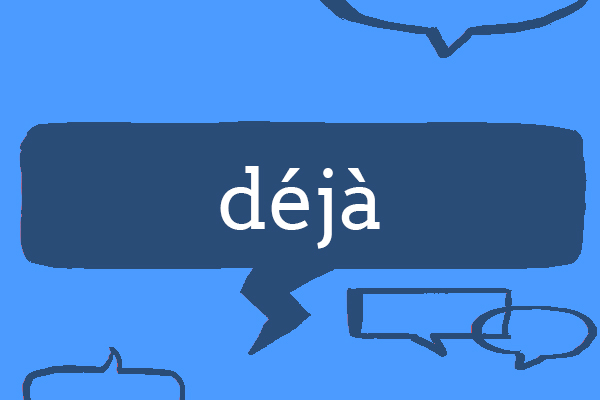Welcome to our weekly blog for French learners. We’re taking a look at a French adverb in this week’s edition – the word déjà.
To hear how it’s pronounced, have a listen to the audio clip first:
Do you feel like you recognise the sound of this word? While it sounds a little different in a French accent, you might already know it from the English term déjà vu (a French borrowing, if you hadn’t already guessed). If you experience déjà vu, it means that you have the sense of going through something or seeing something that you’ve seen before.
A very common word in everyday French, déjà translates as already or before in English. Just as an aside, vu means seen, so the whole phrase is ‘already seen’, which perfectly describes the experience of déjà vu.
As we mentioned at the start, déjà is an adverb. Before we look at some examples in use, you might want to get a refresher from our Easy Learning French Grammar pages on adverbs.
As a quick reminder, think of it as ad- from adjective, a describing word, plus -verb, meaning a doing word. Together these make an adverb – a word describing a verb or an adjective.
Now it’s time to look at the word in action:
Sébastien a déjà fini ses devoirs. Sébastien has already finished his homework.
Je dois aller au travail, il est déjà midi. I have to go to work, it’s already midday.
Vous êtes déjà allés en Espagne ? Have you been to Spain before?
Nous sommes arrivés à dix-sept heures, mais elle était déjà partie. We arrived at 5pm, but she had already left.
C’est déjà quelque chose. It’s a start. (Word for word, this translates as ‘It’s already something’.)
There is also a more informal use of the word, which can be translated in a slightly different way. You’re likely to hear this in conversational French.
Déjà can mean again in English. But it’s important to note that this does not mean ‘again’ in the sense of repetition, or something recurring. It is used for a sense of reinforcement, or to make sure about something you’re asking. We use this naturally in spoken English too.
Let’s look at some examples:
Combien de vous viendront, déjà ? How many of you are coming again?
Quelle date, déjà ? What was the date again ?
Quel nom, déjà ? What was the name again?
Whether you’ve already read some of our Word of the Week blogs before, or it’s your first time here, we hope you’ve learned something useful! See you again for next week’s blog.
Written by Holly Tarbet, freelance copywriter and editor.
All opinions expressed on this blog are those of the individual writers, and do not necessarily reflect the opinions or policies of Collins, or its parent company, HarperCollins.



